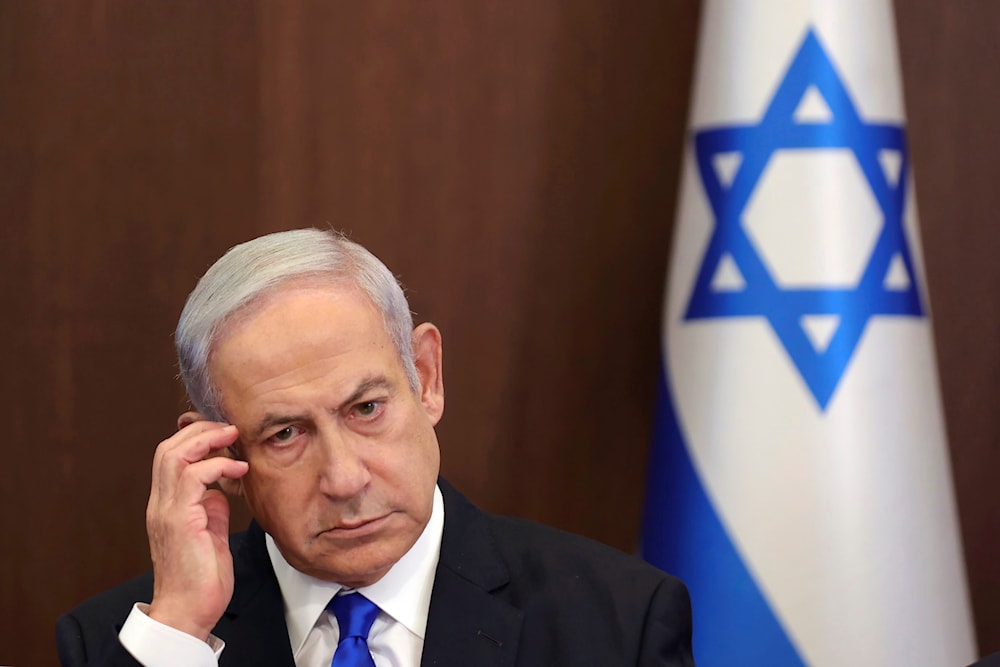Netanyahu under mounting pressure as he mulls instigating Iran
Israeli Prime Minister Benjamin Netanyahu is being subjected to paramount internal pressure as his regime considers attacking Iran once again after the latter settled the score for an Israeli violation of international law.
-

Israeli Prime Minister Benjamin Netanyahu attends the weekly cabinet meeting in the prime minister's office in occupied al-Quds, occupied Palestine, June 25, 2023 (AP)
The Israeli occupation is at a pivotal crossroads as it wants to strike Iran in response to its retaliation against the Israeli violation of international law, as in the attack on the Iranian consulate in Syria, all the while being pressured by its international allies to bite the bullet and remain cautious so as to not escalate the situation further.
Iran's Islamic Revolution Guard Corps (IRGC) Aerospace Force announced that it targeted Israeli positions in occupied Palestine with dozens of drones and missiles, as part of the retaliatory response to the malicious Israeli crime against the Iranian embassy in Syria.
In light of Iran's operation, Prime Minister Benjamin Netanyahu has been out-of-the-ordinarily silent regarding what he might be plotting although he has been extremely outspoken about what he would like to do since the start of the war on Gaza.
Now, however, despite mounting pressure from both domestic extremists advocating for a forceful response and foreign allies advising restraint, Netanyahu has refrained from public commentary on the matter since Sunday, when he lauded what he called a successful interception via a brief post on X.
Meetings of the Israeli occupation's war cabinet, which has convened twice since Iran's operation, have failed to yield a definitive response strategy, at least publicly. Additionally, Netanyahu reached out to US President Joe Biden for consultation.
'Response coming'
Meanwhile, Israeli forces Chief Herzi Halevi told his troops that a response was impending, though specifics regarding timing and nature remained undisclosed.
Raz Zimmt, an Iranian Studies researcher at "Tel Aviv" University, noted the unprecedented nature of the attack, suggesting that even if "Israel" prefers to avoid full-scale confrontation, some form of immediate reaction may be inevitable. "There has been a lot of pressure over the last 48 hours on the Israeli government to respond due to the fact that it was a very unprecedented attack," he told AFP.
Calls within the Israeli occupation for a decisive response have been met with contrasting appeals for patience and strategic considerations, Meanwhile, extremists such as Israeli Police Minister Itamar Ben-Gvir have advocated for a harsh counterattack.
"Impressive defense until now -- now there must be a crushing attack," the far-right minister said on X.
Conversely, former Prime Minister Ehud Barak has decried hawkish impulses while condemning "those who want to set the entire Middle East on fire."
'Israel' must remain cautious
Israeli Knesset Member Gideon Sa'ar echoed sentiments for a so-called 'measured response,' stressing the importance of maintaining strategic priorities in light of the ongoing heightened tensions.
"Israel does not need to rush in its response and disrupt the priorities it set for itself," Sa'ar said on X. "Now, the focus needs to return to victory in Gaza: Toppling Hamas and freeing the hostages."
It is not at all being swept under the rug that the Israeli occupation needed help from four countries to stop the Iranian response to its criminality, yet although the US, UK, and France were among those who stood by the Israeli occupation, the fourth being Jordan, there have been numerous warnings from Western governments against escalation.
Read next: US won't join any Israeli retaliation against Iran: US official
A US official said Sunday that Washington would "not participate" in any potential counterattack by "Israel", while British Foreign Secretary David Cameron and French President Emmanuel Macron also cautioned against retaliation.
Calev Ben-Dor, a former analyst for the Israeli foreign ministry, anticipates a strategic strike at a time and place of "Israel's" choosing, albeit within the constraints of its alliance commitments.
"At the same time, in the Middle East, one cannot be attacked by more than 300 missiles and drones and not do anything," Ben-Dor told AFP. "I assume nothing will happen in the next... two weeks or so. But I think Israel will, at some stage, strike back, probably more in a covert way than a public way, at a time and place of its choosing."
Jean-Loup Samaan, an analyst at the French Institute for International Relations, suggests that a direct confrontation with Iran is unlikely without consultation with the Biden administration, given the occupation's reliance on US support for its security and military infrastructure. "Israeli systems are largely financed by the Americans, so I don't think they will play around and be ungrateful," he stressed.
US-Israeli deterrence a 'massive failure' against Iran: John Bolton
The United States Former National Security Advisor, John Bolton, said Iran's retaliatory operation on Saturday night was "a massive failure of Israeli and American deterrence".
In an interview with CNN, Bolton stated that regardless of the magnitude of damage caused by Iran's attack against occupied territories, the US and "Israel" should restore deterrence by a disproportionate and "far stronger" Israeli response.
He claimed this would teach Iran that what it hopes to achieve from a future attack "would be far outweighed by the damage that would be caused" by "Israel's" response.
Amid Operation True Promise, US officials announced that the US would help "Israel" intercept and deter Iranian drones. However, Israeli and American defenses failed as Iranian drones and ballistic missiles rushed to meet their targets on occupied territories.
Israeli journalist Amir Bohbot considered that any future confrontation with Iran could end with "a barrage of drones and ballistic missiles," similar to those that targeted the occupied territories early Sunday, as "the dam (barrier) was breached and has collapsed."

 5 Min Read
5 Min Read








